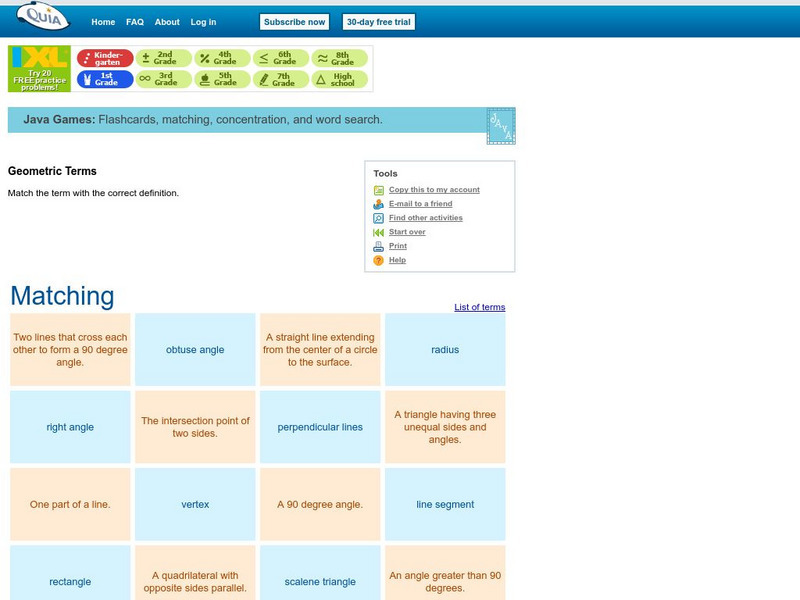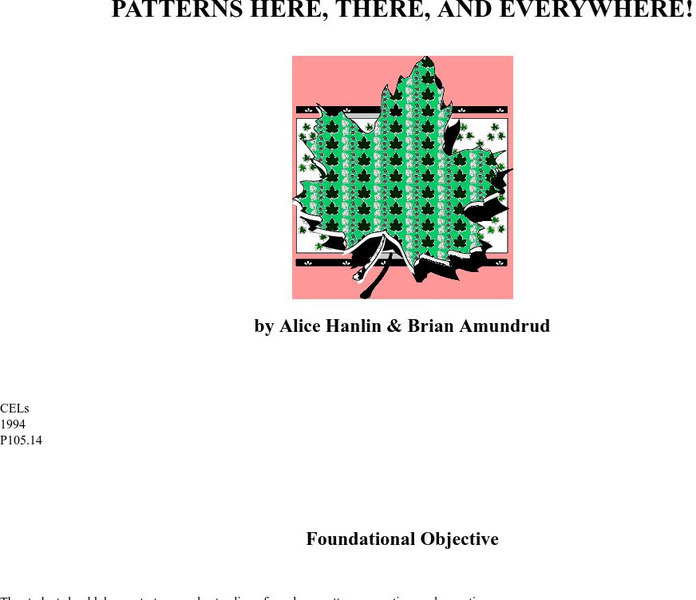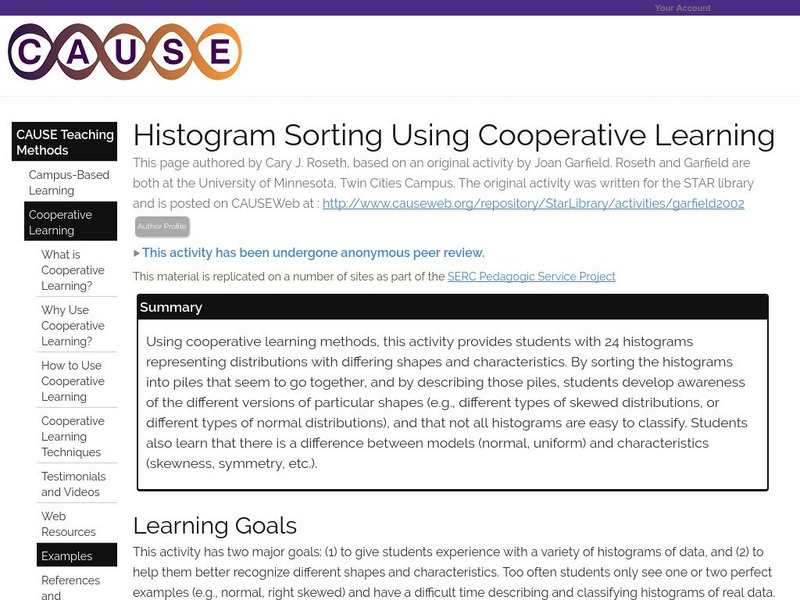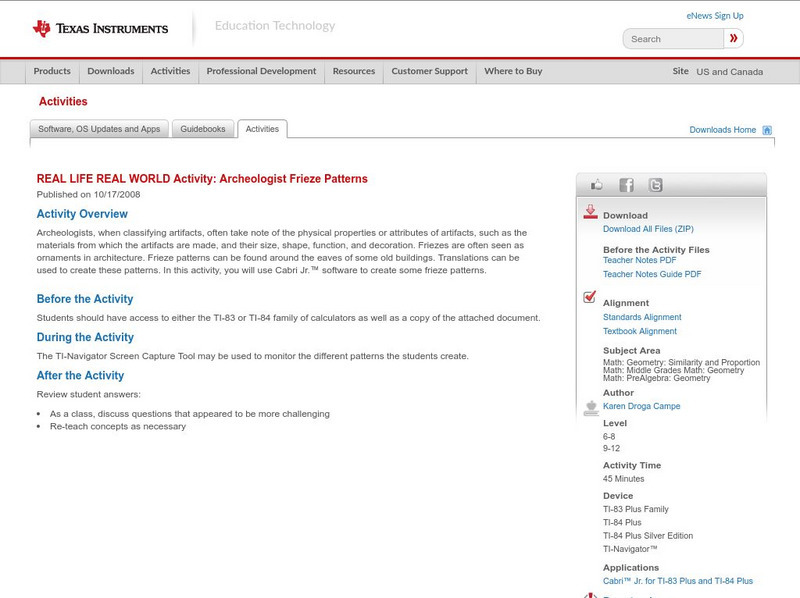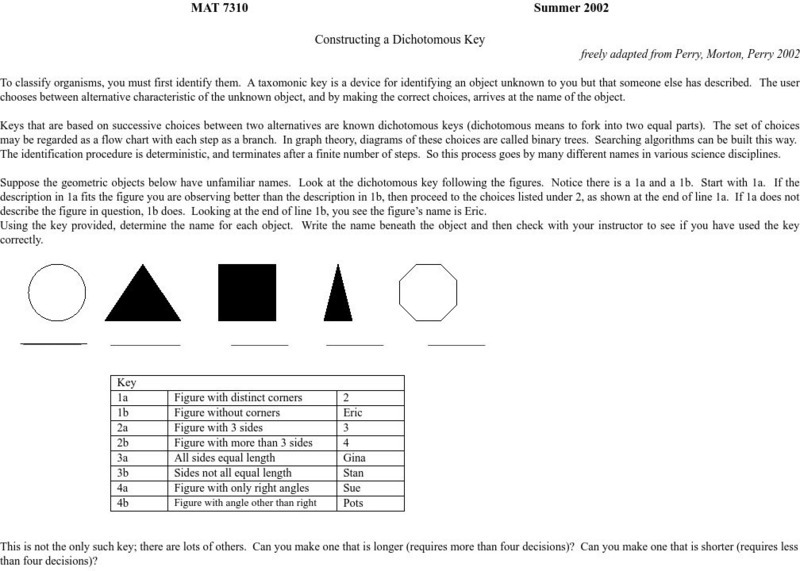University of Regina (Canada)
University of Regina: Math Central: Lesson: Mr. Z's 5 Minute Game of Geometric Pandemonium
Students make a series of geometric drawings of points, obtuse angles, rays, polygons, and the like. Each child is given one but not allowed to show anyone else. The drawing is then taped to the back of the child in front of them. The...
Quia
Quia: Geometric Terms Matching
Do you need practice remembering or learning different geometry vocabulary words and definitions? This matching game is the web site for you! There is a link to a list of terms with definitions you can click if you want to see if you are...
Varsity Tutors
Varsity Tutors: Aplus Math: Geometry Hidden Picture (Non Java)
Uncover the hidden picture by correctly matching geometry terms to their corresponding diagrams. This fun interactive online game will have your students asking to practice their math!
University of Regina (Canada)
Univeristy of Regina: Math Central: Patterns Here, There, and Everywhere
This lesson plan on early patterning is well written, well planned, and extensive. The math content is substantial for this age. There are lots of connections to other content areas. Materials needed are readily available or provided for...
US Department of Education
Helping Your Child Learn Math: Math in the Home
An excellent compilation of activities that engage parents and children in math explorations at home. Detailed lessons covering a wide range of math topics such as fractions, measurements, money, data collection, and math in newspapers....
Science Education Resource Center at Carleton College
Serc: Histogram Sorting Using Cooperative Learning
Students work with 24 histograms representing distributions with differing shapes and characteristics. By sorting the histograms into piles that seem to go together, and by describing those piles, students develop awareness of the...
Science Education Resource Center at Carleton College
Serc: Investigation of the Minnehaha Falls Area
A lesson plan where students observe rock types and classify the rocks in the Minnehaha falls area. Students will also make predictions about the cause of the shape of the landscape. Students will record their findings in a journal....
Science Education Resource Center at Carleton College
Serc: Rock Investigation
In this activity students will observe and investigate rocks in order to classify them in terms of color, shape, texture and size.
Alabama Learning Exchange
Alex: "Polly"gon Pockets
Lesson plan that helps students explore the attributes of polygons through the use of cooperative groups. Students use jigsaw puzzles and foldable polygons. They also connect the attributes of specific polygons with objects in the real...
Texas Instruments
Texas Instruments: Real Life Real World Activity: Archeologist Frieze Patterns
Archeologists, when classifying artifacts, often take note of the physical properties or attributes of artifacts, such as the materials from which the artifacts are made, and their size, shape, function, and decoration. Friezes are often...
Khan Academy
Khan Academy: Categorize Quadrilaterals
Classify and compare rectangles, rhombuses, and squares. Students receive immediate feedback and have the opportunity to try questions repeatedly, watch a video or receive hints. CCSS.Math.Content.3.G.A.1 Understand that shapes in...
BiologyWise
Biology Wise: Different Types of Bacteria
Discusses the different criteria used to classify bacteria and the groups of bacteria within each category. Groups are organized by characteristics such as morphology, shape, cell wall structure, and presence of flagella.
McGraw Hill
Glencoe: Self Check Quizzes 1 Two Dimensional Figures Polygons
Use Glencoe's randomly generated self-checking quiz to test your knowledge of two-dimensional figure-polygons. Each question has a "Hint" link to help. Choose the correct answer for each problem. At the bottom of the page click the...
BiologyWise
Biology Wise: Eubacteria Kingdom
The characteristics of the eubacteria kingdom are described, how they are classified, and their shape and structure. Includes a list of facts about eubacteria.
Doina Popovici
Math Play: Geometric Figures Game
An online game where students use their skill to classify geometrical figures.
Other
Villanova University: Constructing a Dichotomous Key
This exercise provides information on how to construct a dichotomous key using geometrical shapes. Another exercise shows how a key can be constructed based on traits in a classroom group.
ClassFlow
Class Flow: Three Dimensional Figures
[Free Registration/Login Required] This flipchart describes the characteristics of polyhedrons and asks students to classify figures according to the number of vertices, faces, and bases of the figures.
ClassFlow
Class Flow: Triangles
[Free Registration/Login Required] Using this flipchart students learn to recognize and classify different triangles, including equilateral, isosceles and scalene. The teacher will use this lesson plan to review different types of...
Australian Museum
Australian Museum: Igneous Rock Types
Learn about the different types of igneous rocks and how they are classified.
Science Buddies
Science Buddies: Finding Phyla
Animals come in all shapes and sizes, each a small part of the amazing diversity of life. These differences can also help us to classify animals into different groups. Which group do you belong to? Do this experiment to investigate the...
NASA
Nasa: Aerial Photography: The Adventures of Amelia the Pigeon
An animated adventure story, developed by NASA, that helps children understand earth science concepts by using satellite photography and other types of aerial photographs to identify physical features on the surface of the earth. Teaches...
Children's Museum
The Children's Museum of Indianapolis: Dinosphere
Students will learn how dinosaurs were classified, compare shapes and sizes, and explore how paleontologists make discoveries. They'll analyze how dinosaurs interacted back in the day, and make their own dinosaur drawings and a fossil cast.
Khan Academy
Khan Academy: Constructing Triangles
Practice constructing triangles. Students receive immediate feedback and have the opportunity to try questions repeatedly, watch a video or receive hints.
San Diego Natural History Museum
San Diego Natural History Museum: Mineral Matters: Grow Your Own Crystals
Here are step-by-step instructions on how to create crystals. This is a great experiment for students to use in learning about the structure and formation of crystals.



